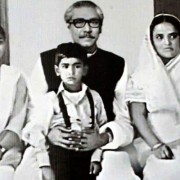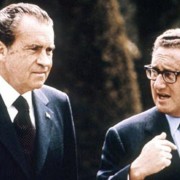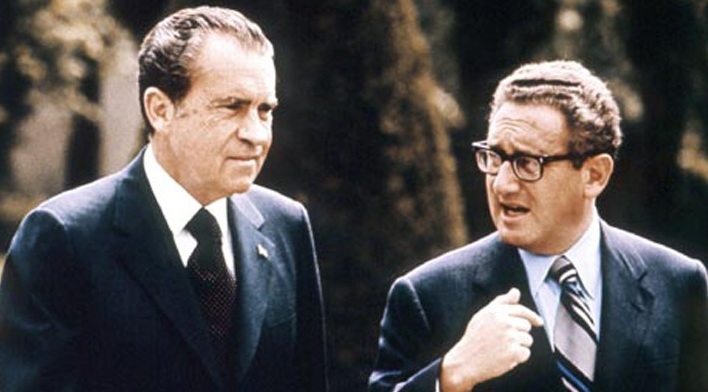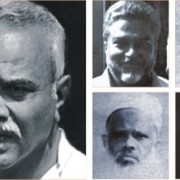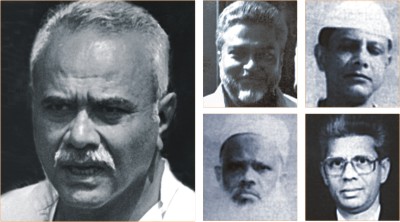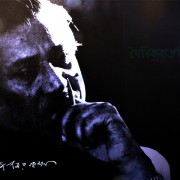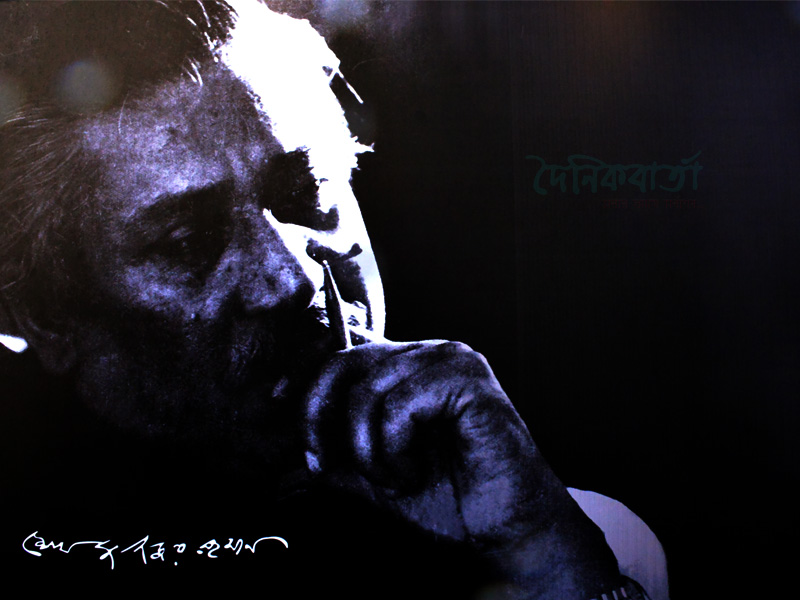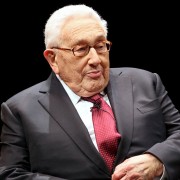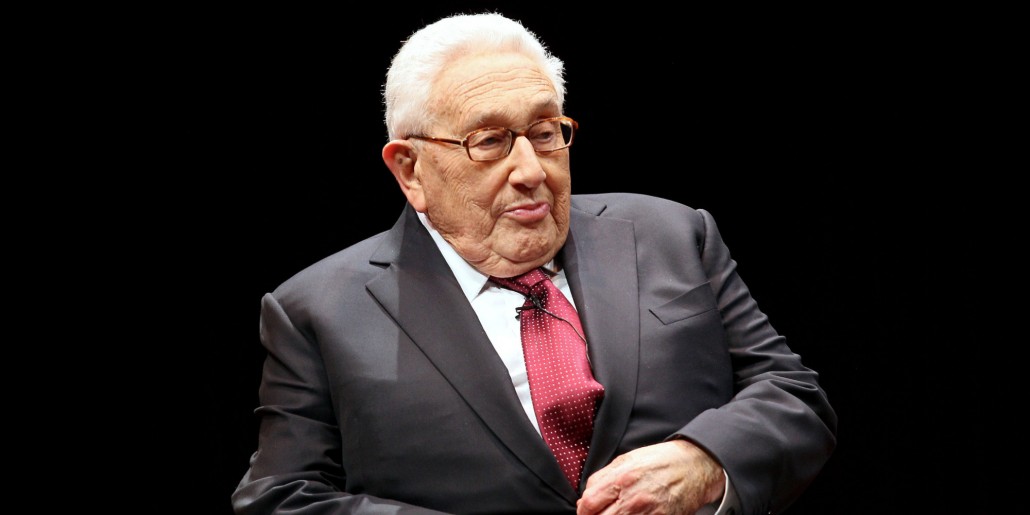Kissinger compared Bangabandhu to Allende
/0 Comments/in A Brief, Articles, History, Uncategorized /by RonZIn his book “The Trial of Henry Kissinger” noted journalist Christopher Hitchins, former editor of Harper’s magazine, wrote “Kissinger had received some very bad and even mocking press for his handling of the Bangladesh crisis, and it had somewhat spoiled his supposedly finest hour in China. He came to resent the Bangladeshis and their leader, and even compared (this according to his then aide Roger Morris) Mujib to Allende.”
“As soon as Kissinger became Secretary of State in 1973, he downgraded those (the US diplomats stationed in the US Consulate in Dhaka) who had signed the genocide protest in 1971,” the book says. About Kissinger’s trip to Bangladesh, Hitchins says, “In November 1974, on a brief face-saving tour of the region, Kissinger made an eight-hour stop in Bangladesh and gave a three-minute press conference in which he refused to say why he had sent the USS Enterprise into the Bay of Bengal three years before.”
“Within a few weeks of his departure, we now know, a faction at the US embassy in Dacca began covertly meeting with a group of Bangladeshi officers who were planning a coup against Mujib. On 14 (15) August 1975, Mujib and forty members of his family were murdered in a military takeover. His closest former political associates were bayoneted to death in their prison cells a few months after that,” the book says.
Execution of five killers of Bangabandhu: Flashback
/0 Comments/in A Brief, Articles, History, Uncategorized /by RonZe-News® | The NEWS Company…DHAKA, August 15, 2015 : The nation was freed from an age-old stigma following the execution of the verdict of five among the death sentence awarded accused in the murder case of Father of the Nation Bangabandhu Sheikh Mujibur Rahman on January 28, 2010 at Dhaka Central Jail. On the night, the process of execution began at 12.01 am. At first, former Lieutenant Colonel of Army Mohiuddin Ahmed (Artillery) and former Major Bazlul Huda were executed. Few minutes later, sacked Lieutenant Colonel Faruk Rahman was executed. At last, former Lieutenant Colonel Shahriar Rashid Khan and AKM Mohiuddin Ahmed (Lancer) had been executed.
The entire process to execute the verdict was completed within 40 minutes. After the execution, prison officials told the waiting reporters about the expectations of five killers. Hundreds of people from all walks of life took to the streets surrounding Dhaka Central Jail. Five ambulances were readied to carry the bodies to the relatives of the executed Army officials. Besides, a police van carrying five coffins made from wood and another private vehicle carrying two beds were kept in front of the prison gate.
The beds were used to bathe the bodies after execution. Members of Rapid Action Battalion (RAB), Armed Police Battalion and plain-clothes policemen were patrolling the streets surrounding the jail and they stopped vehicular movement on the streets for several hours. Dhaka District Magistrate and Deputy Commissioner Jilar Rahman, Civil Surgeon Dr Mushfiqur Rahman and additional district magistrate Abhijit Sarker along with director general of Prisons Brigadier General Ashraful Islam entered the prison to see the execution. The then home secretary Abdus Sobhan Sikder and the then DMP commissioner AKM Shahidul Haque were also present on the occasion.
Earlier, some 61 relatives of the accused met them for the last time. Of them, two detained sons of Mohiuddin Amhed were taken from Kashimpur Prison to Dhaka Central Jail to meet their father. In 1998, a court handed down capital punishment against 15 former Army officers for killing Bangabandhu and most of his family members. Later, the High Court, in a verdict, released three of them. Among 12 accused of the case, five were executed, six are fugitives and one died in Zimbabwe.
Bangabandhu murder sparked international denunciation
/0 Comments/in A Brief, History, Uncategorized /by RonZThe international community is found to have sharply denounced the August 15, 1975 carnage as the nation reviews the aftermath of the August 15, 1975 putsch coinciding with his 40th martyrdom day. Global leaders like Willy Brandt were severely moved by the murder of Bangladesh founder along with most of his family members by some people who were none but his own countrymen.
“After the killing of Mujib, Bangalees can no longer be trusted. The Bangalees who can kill Mujib, can perpetrate any heinous deed,” said Nobel Laureate the then West German leader Willy Brandt in an emotional comment, even going beyond the diplomatic practices. Indian-born British citizen and noted litterateur Nirad Chandra Chaudhuri described Begalees as ‘Insidious Bangalee’ saying “the Bangalees exposed to the people of the world their suicidal character by killing the dreamer of Bangalee nation and father of the state named Bangladesh”.
“That did not end here an Indemnity Ordinance was promulgated to indemnify the killers. Further, those killers were rewarded with prize posting in different Bangladesh missions abroad. Not only Ziaur Rahman, his wife Khaleda Zia as well, rewarded the killers in various ways,” he wrote in the article. On August 16 in 1975, The Times of London mentioned that despite all things, Bangabandhu would always be remembered with due respect as Bangladesh has no real existence without Sheikh Mujib. The Daily Telegraph, published on the same day, said millions of people of Bangladesh would consider the atrocious killing of the Bangladesh leader as an irreparable loss to the country and its people.
Later on August 28, another esteemed newspaper ‘The Guardian’ published an article saying that people of Bangladesh apparently returned to the Martial Law rule and the religious campaign favouring the regime of military dictatorship Ayub Khan. On 16 August 1975 in news review programme of All India Radio ran a commentary saying “Jesus died. Now millions of people remember him by wearing cross. Perhaps, once Mujib as well will be like that.”
On the same day The Daily Telegraph published from London said, “Millions of people of Bangladesh shall consider the gruesome death of Sheikh Mujib to be irreparable loss”.
Sheikh Mujib is an object of regards and love of people even today. That prediction of international media came true. Therefore, in the language of the poet I would like to say, The world famous Time Magazine also published an article on April 5 in 1982 where it said the democratic era in Bangladesh ended with the August 15 and the assassination of Sheikh Mujib.
“As long as stay the Padma-Jamuna/Gouri-Meghna flowing on thy accomplishment will live on/Sheikh Mujibur Rahaman,” wrote famous writer and poet Annodasankar Roy.
Kissinger’s visit to Bangladesh was ominous
/0 Comments/in A Brief, Articles, History, Uncategorized /by RonZBefore the brutal murder of Bangabandhu on August 15, 1975 the visit of the US secretary of state, Henry Kissinger, was quite significant. On October 30, 1974 Kissinger made a 19-hour stopover in Bangladesh. During the visit he met Bangabandhu Sheikh Mujib for a couple of hours at the “Gonobhavan.”
According to US journalist Lawrence Lifschultz, “A month after Kissinger left Dhaka the conspirators at the US Embassy became active.” Prof Abu Sayeed in his book Bangabandhu: Facts and Documents and Lifschultz in his Bangladesh: The Unfinished Revolution writes about it elaborately. After talking to Bangabandhu, Kissinger addressed a press conference where he described Bangabandhu “as a man of vast conception”. When asked why he had sent the Seventh Fleet against such a man, Kissinger avoided a direct response and hurriedly left the conference room.
According to Lifschultz those who were aware of Kissinger’s plans at that time felt that Kissinger’s comments were a form of ridicule. Besides, when Bangabandhu went to New York to attend the UN session the Bangladesh Mission could not find a schedule for Bangabandhu with the US president, although that is the norm for first-time visiting heads of government. Later when Bangabandhu decided to visit Washington D C on his own the Americans hurriedly arranged a 15-minute appointment with the president. But the atmosphere was very cold.
However, Kissinger met Bangabandhu at New York where he was photographed with Bangabandhu. Apart from the US visit a number of other incidents also preceded Bangabandhu’s killings. In June 1974 Pakistan’s Prime Minister Zulfiqar Ali Bhutto visited Bangladesh and the media publicized the killings and barbarism of the Pak army in 1971 extensively. Later, on May 1, 1975 Vietnam was liberated. Bangladesh’s quick recognition of the socialist country from where the US had fled left a deep impression on the Americans. Besides, the visit of Khondoker Mushtaque Ahmed to Iran that year was also significant.
Untitled
 The Day make the victory completeমে 10, 2019 - 8:43 অপরাহ্ন
The Day make the victory completeমে 10, 2019 - 8:43 অপরাহ্ন “Bangabandhu” – An illustrious leaderমার্চ 30, 2018 - 8:06 অপরাহ্ন
“Bangabandhu” – An illustrious leaderমার্চ 30, 2018 - 8:06 অপরাহ্ন Unesco recognises Bangabandhu’s 7th March speechঅক্টোবর 31, 2017 - 12:15 অপরাহ্ন
Unesco recognises Bangabandhu’s 7th March speechঅক্টোবর 31, 2017 - 12:15 অপরাহ্ন National Mourning Day observedআগস্ট 16, 2016 - 12:39 পূর্বাহ্ন
National Mourning Day observedআগস্ট 16, 2016 - 12:39 পূর্বাহ্ন National Mourning Day todayআগস্ট 15, 2016 - 1:43 অপরাহ্ন
National Mourning Day todayআগস্ট 15, 2016 - 1:43 অপরাহ্ন
L A T E S T
Political Career
 Bangabandhu had no illusions about Pakistanisআগস্ট 15, 2016 - 12:44 পূর্বাহ্ন
Bangabandhu had no illusions about Pakistanisআগস্ট 15, 2016 - 12:44 পূর্বাহ্ন HIS GREATNESS CANNOT BE TARNISHEDএপ্রিল 14, 2015 - 8:03 অপরাহ্ন
HIS GREATNESS CANNOT BE TARNISHEDএপ্রিল 14, 2015 - 8:03 অপরাহ্ন THE STORY OF AN INSPIRATIONAL FIGUREজানুয়ারি 17, 2014 - 2:20 অপরাহ্ন
THE STORY OF AN INSPIRATIONAL FIGUREজানুয়ারি 17, 2014 - 2:20 অপরাহ্ন The Declaration of Independenceজুন 6, 2013 - 5:49 অপরাহ্ন
The Declaration of Independenceজুন 6, 2013 - 5:49 অপরাহ্ন The day they killed Bangabandhuজুন 6, 2013 - 5:34 অপরাহ্ন
The day they killed Bangabandhuজুন 6, 2013 - 5:34 অপরাহ্ন

